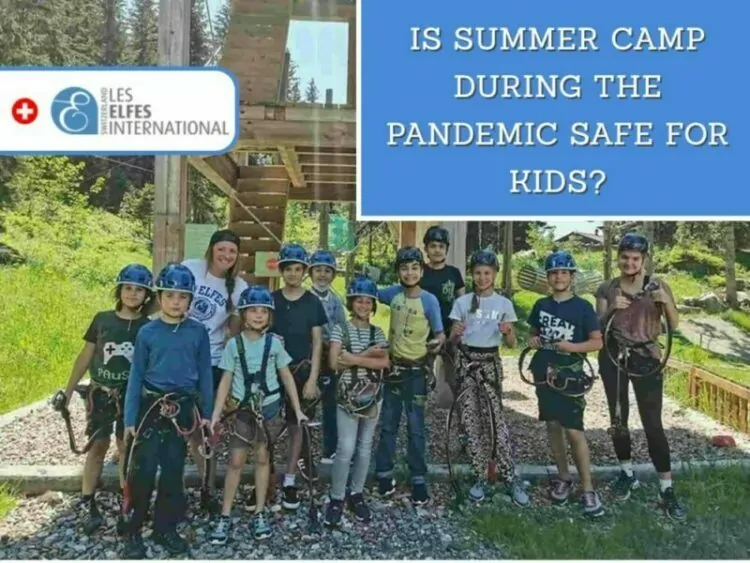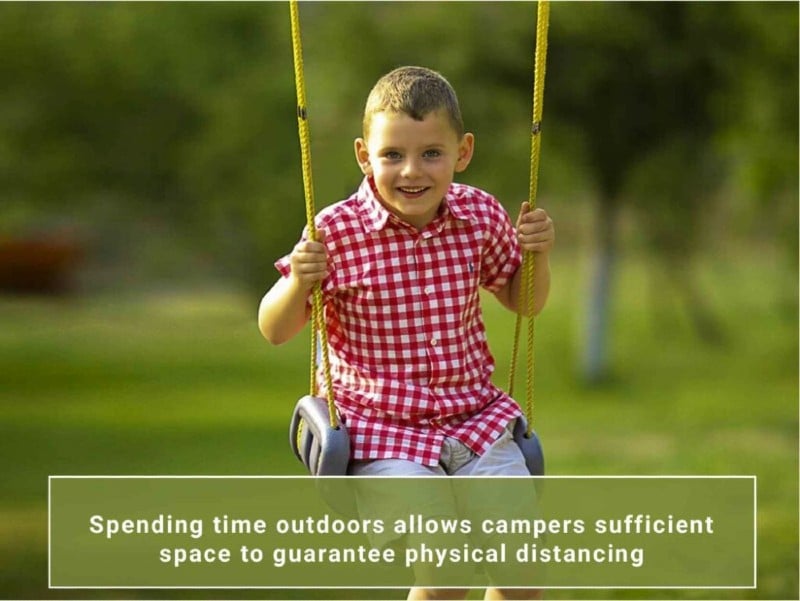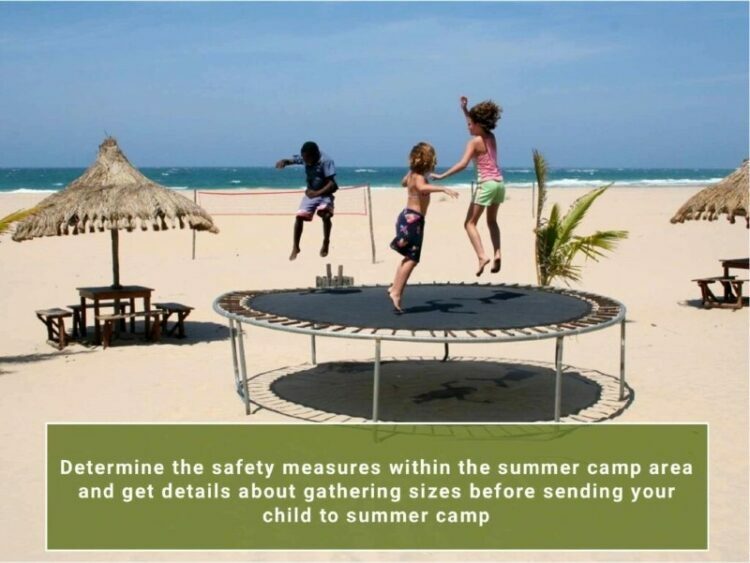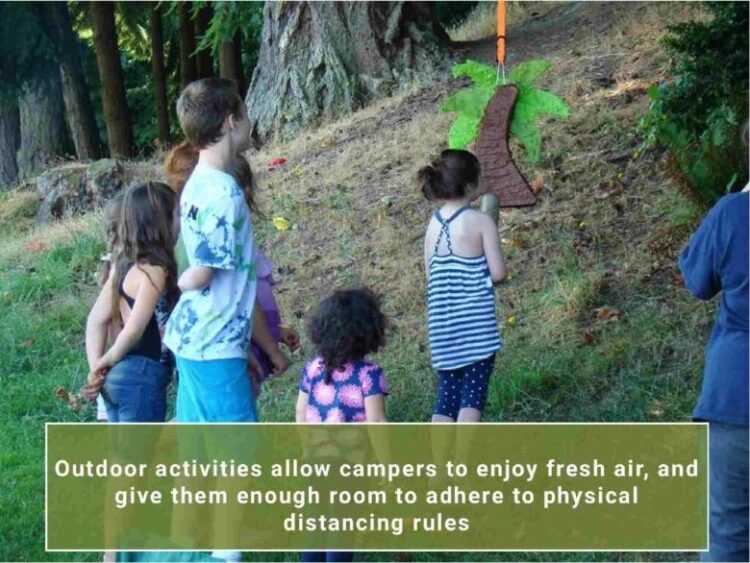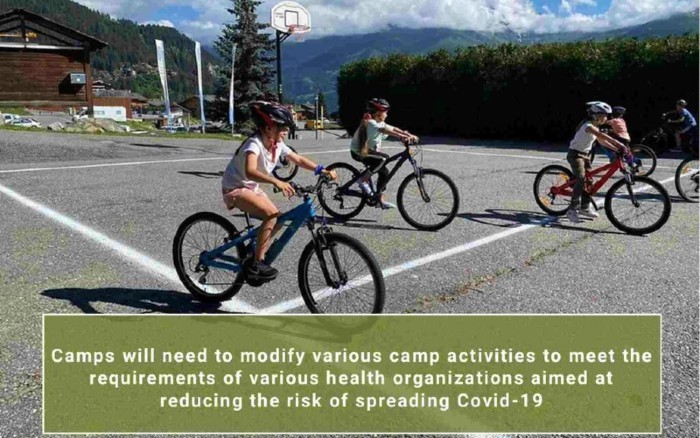Sending kids to summer camp seemed like an uphill task last year at the beginning of the pandemic. Today, children are hopeful of attending camp, especially with the invention of the Covid-19 vaccine.
Are you wondering whether or not to send your child to sleep-away camp? This article will help you make an informed decision. Read on for extensive details on summer camp safety amid the pandemic.Are you considering enrolling your child on a Summer Camp in 2021?
Find out what Les Elfes has to offer!
Les Elfes Summer CampGuidelines in Place to Guarantee Safety in Summer Camps During Covid
These safety guidelines are applicable for both overnight and day camps. Every camping facility should adhere to the CDC safety protocols. Remember, these safety measures will help lower the spread of Covid-19 among camp staff and campers. According to the American camp association in Georgia, all camp administrators should strive to reduce risks for all attendants. These guidelines include:
· Wearing Masks Properly
If any campers or camp staff have been fully vaccinated, they will not need to wear masks during summer camp. However, this depends on the state, federal, tribal, territorial, or local laws. Campers above two years should always wear masks indoors and outdoors unless they are eating or swimming. All camp staff, especially those that facilitate camp activities daily, should wear double masks. Doing so lowers the risk of spreading Covid-19.
· Focus on Outdoor Activities
Covid-19 is a high-risk respiratory disease whose chances of spreading increase when people are stuck indoors. As a result, world health experts and professionals from the American academy of pediatrics recommend outdoor activities to lower the risk of Covid-19. Spending time outdoors allows campers sufficient space to guarantee physical distancing while creating a safer environment for the kids.
· Maintaining Physical Distance
According to the CDC officials, summer camps should adopt the “cohorting” system. Here, staff and campers are placed in pod-like classes and remain there whenever possible. This system helps reduce risk among large groups. In addition, everyone inside the cohorts must maintain a 3-feet physical distance from one another.
· Adoption of Testing and Monitoring Practices
Some summer camp facilities conduct testing and monitoring examinations on the staff members and campers. These assessments include temperature checks every morning. CDC officials say that people who are not yet vaccinated should get regular Covid-19 tests.
· Enhanced Hand Hygiene
Summer camp organizers should provide various handwashing stations complete with soap and running water. Campers and camp staff should clean their hands regularly where possible. In addition, the use of hand sanitizers should be encouraged during off-site activities.
· Thorough Cleaning, Disinfecting, and Facility Maintenance Practices
All shared rooms and surfaces such as the dining hall, cabin bunks, and game rooms should be thoroughly disinfected and cleaned daily. Facilities should be well-arranged to facilitate sufficient ventilation and social distancing where possible.
Additional Guidelines for Campers Attending Overnight Camps
Camp organizers request attendants to isolate or quarantine for fourteen days before embarking on the summer camp trip. Campers traveling from abroad through rail, air, or buses should follow the set local travel regulations. Remember, some countries require travelers to have additional preventive Covid-19 tests and adhere to isolation, according to the New York Times.
· Adopt a Contingency Plan to handle Emergency Sickness
Some campers may use shared transport services which may expose them to the Covid-19 virus. As a result, camp organizers and supervisors should have a laid down quarantine plan to handle possible emergencies.
· Contact Tracing
Should the camp experience Covid-19 infections, the camp administrators will need to contact and work together with the local or state public health officials to facilitate:
- The isolation of people with Covid-19 related symptoms
- Testing of people with Covid-related symptoms
- Quarantining of all close contacts of individuals with Covid-related symptoms
- Alert family members of all kids attending camp
Remember, fully vaccinated people with no Covid-related symptoms do not require quarantine. However, this depends on the local, state, or federal regulations.
Is Sending Your Child to Summer Camp During the Pandemic Risky?
The possibility of campers contracting Covid-19 depends on the viral level of the infectious disease within a specific area. Leverage the following tips to determine the risk level of your preferred summer camp facility before the trip.
· Understand the Prevailing Limits on Crowds
The CDC (the Centers for Disease Control and Prevention) is against large crowds. Remember, these regulations may vary from one region to the other. Determine the safety measures within the summer camp area and get details about gathering sizes before sending your child on a summer camp trip.
· Determine the Coronavirus Cases in the Area
What is the Coronavirus situation in your locality? Are the numbers dropping, increasing, or stagnant? Even when your locality has not been affected by the virus, you want to consider the summer camp region, especially if your child is going abroad. Contact the health department within your locality to obtain this information. You may also want to check different resourceful websites and local newspapers for detailed information.
· Ask Questions With an Emphasis on Safety
Whether you want to send your child to your favorite summer camp or want to try a new location, emphasize safety and consider the cons and pros. Before choosing your ideal summer camp facility, you want to understand:
- The number of campers allowed in the facility.
- The regulations on group sizes? How many campers will be in one group? Will small groups have the same supervisor?
- The camp’s operating program. Is it running under full or partial capacity arrangement? Does it offer both day and sleep-away camp services?
- What about physical distancing? How does the facility plan to achieve the three to six feet apart from a physical distance during naps, activities, and mealtimes? Does the facility have sufficient areas and rooms to maintain the social distancing rules?
- What are the pickup and drop-off arrangements for day campers?
- Determine steps the camping facility has in place to prevent the spread of the virus while campers are in attendance.
Health Monitoring Practices
How do the facility monitor staff members and campers during the camping period? What procedures do they have in place to isolate ill individuals? What communication method will they use to alert you if your kid falls sick?
What to Lookout for in Summer Camps Amid the Pandemic?
Seek answers to the following questions before sending your child to a summer camp facility during the pandemic.
· What Measures has the Camp Adopted to Ensure Campers Adhere to Covid-19 Safety Regulations?
Camps should adopt age-appropriate strategies to ensure campers practice social distancing, hand hygiene, and wear masks when necessary. Maintaining these practices can be a difficult task for young kids, and camp staff members should be ready to remind them often.
· Will most Activities Take Place Outdoors or Indoors?
Outdoor activities allow campers to enjoy the fresh air and give them enough room to adhere to physical distancing rules. Further, they lower the risk of spreading and contracting Covid-19—further, the outdoors enabling campers to experience nature which boosts their overall and mental health. However, camp organizers should clean and disinfect playing items and surfaces every day to prevent kids from contracting germs.
· What if a Camper or Staff Member Gets Sick?
Camps should adopt a robust plan for measures to take should anyone start experiencing symptoms of Covid-19. The program should align with the state or local public health regulations and policies on responding to and reporting possible Covid-19 cases.
· Is there Ready Support for Campers who require Specialized Health Care?
Camp directors and organizers should strive to meet every child’s needs. If your kid requires specialized health care, consult your pediatrician and the camp organizers to determine the ideal accommodation package for them.
· How will Meal and Snack Times Work?
Where possible, kids should carry their own meals, especially if they will be attending day camp. Camps should have separate eating areas for different small groups. This arrangement is less risky than eating in cafeterias or dining halls. Campers should always carry their own water bottles.
Considerations to Make Before Sending Your Child to Summer Camp Today
With the advent of vaccination, this summer promises to be better than last summer, especially now that campers above 12 years old can get the Covid-19 vaccine. What are some of the things that parents should consider before releasing their children for summer camp? Read on to find out.
· Understand Safety Protocols the Summer Camp has Adopted to Protect Campers from Covid-19
Recently, the CDC announced a detailed and updated guide for overnight and day summer camps. The guide highlighted various fundamental principles. For example, it recommended that all eligible camp staff members and campers should get the Covid-19 vaccine.
If some camp staff and campers are unvaccinated, the CDC recommended enhanced physical distance and outdoor activities, reduced capacity, and enhanced ventilation in indoor areas. Further, the CDC recommended wearing masks indoors and within some outdoor situations.
Determine the strategies that your preferred camping facility has adopted to adhere to these requirements. Remember, many of these regulations apply for overnight and day camps.
· Determine Risk Factors and Get the Vaccine
Parents should think about the specific risk factors for each potential camper and organize vaccination for eligible children. Remember, if your child is ineligible for vaccination and has underlying health complications like congenital heart illness or asthma, they may be at a higher risk of contracting Covid-19. If your child has a weak immune system and has not been vaccinated, then remaining at home would be ideal for protecting them from the virus.
· Find Out How Camp Activities during the Pandemic Will Differ From Pre-pandemic Times
Some camp practices will not be applicable during summer camp, especially for unvaccinated campers. For example, health experts have advised against full-packed rooms where campers converge and engage in song and dance. While campers will be allowed to sing, they can only do so outdoors.
Parents and other outsiders may be barred from the camp premises, while camp staff may have to remain within the camp premises until the camp is over. Some of the fun and exciting activities involving campers competing against one another will be highly discouraged. Camps will need to modify various camp activities to meet the requirements of various health organizations aimed at reducing the risk of spreading Covid-19.
Many camping facilities have canceled day camps, and you want to confirm the arrangements in place before planning a trip for your child. Understand how the camp intends to ensure that campers maintain the required physical distancing while at the facility.
· Find out what will Happen Should Your Child Get Sick
Camp policies will vary from one facility to the other. For example, should your child develop covid related symptoms while on day camp, the facility will isolate them before alerting you. Covid-tests under such circumstances are highly recommended, and if the child tests positive, they will only return to the camping facility after 10-14 days or when the symptoms have subsided.
If the child has contracted Covid-19 at the camping facility or other people in your household have contracted the virus, the kid may need to stay in quarantine for approximately 14 days if campers develop Covid-19 symptoms while in an overnight camp, the camp staff should isolate them immediately and organize a Covid-test.
Should the results turn positive, camp staff should transfer the child to a dedicated facility where they can receive specialized medical care. The camp staff should alert you immediately and allow you to either pick your child or allow them to remain at the quarantine facility until they recover.
Remember, campers will still have a fun camp experience regardless of all the set regulations.
· Determine Sleepaway Camp Regulations
If your child is attending a sleep-away camp, be sure to seek answers to the following questions.
- Does the camping facility have medical staff, and do they have specialized training to handle Covid-19 related complications?
- How will you contact me in case of an emergency?
- Is there a hospital or healthcare facility nearby?
- Will campers and camp staff require quarantining before and after camp?
Making the Final Decision
Remember, you hold the decision on whether to release your child for overnight hor day camp. Consider the child’s unique risk factors before making the final decision. If your family has a higher risk of Covid-19 and related complications, you may want to suspend any summer camp plans until the situation improves.
If your child requires specialized healthcare, consult their pediatrician before sending them to camp. If you choose to send your child to summer camp, ensure they understand the following:
- Thorough hand washing practices. Train them child, and have them practice handwashing with soap and running water.
- Teach them how to wear masks properly and understand the importance of having them on for extended periods.
- Demonstrate how physical distancing operates.
- Remind them of the importance of proper respiratory etiquette. Children should sneeze or cough into a tissue, discard it, and wash their hands.
- Teach them the importance of following the directions set by the camp supervisors.
Finally
- If your child is eligible for the Covid-19 vaccination, let them get fully vaccinated before embarking on the summer camp trip.
- Ensure the camping facility has adopted safety protocols to reduce the spread of Covid-19 within the facility.
- Ensure the camp has in place robust measures to handle any Covid-19 cases should they arise.
- Campers will still have fun despite the strict regulations aimed at protecting them against the virus.
ARE YOU LOOKING FOR A SUMMER CAMP FOR YOUR CHILD?
VISIT OUR SUMMER CAMP PAGE CONTACT OUR HEADOFFICE




